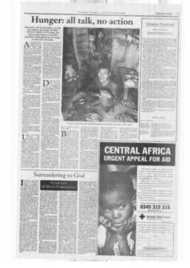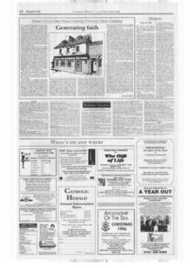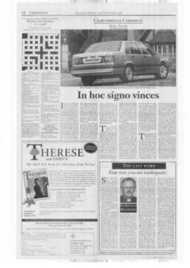Page 5, 22nd November 1996
Page 5

Report an error
Noticed an error on this page?If you've noticed an error in this article please click here to report it.
Tags
Share
Related articles
Boardroom Coup At `the Catholic'
The Friendly Society
Every Parish To Have Its Own Mortgage Adviser
Catholic Building Society Celebrates 40th Anniversary
All Parish
Something's cooking in the boardroom and in your parish
Every parish in England and Wales could soon have its own mortgage adviser, thanks to the Catholic Building Society. For its founder Nona Byrne, her late husband's dream of affordable housing for all is ever closer to realisation, she tells JOE JENKINS
WHEN MARGARET Thatcher sold council tenants
their own homes, one would have thought that the Catholic Building Society would have welcomed the availability of cheap housing, a truly democratic (and opportunistic) move that gave lower income families the chance to buy into the Thatcherite dream. But, according to founder and chairman the Rt Hon Nona Byrne, the reality was somewhat different.
With the help of the society, one client bought her council
flat for L12,000 but
failed to keep up the payments on the mortgage. Mrs Byrne, always one for the personal (but by no means menacing) touch, paid her a visit.
"It was pretty lush inside, with a new fireplace and new carpets.
"This chap was there, who I summed up pretty quickly. That was her brother, she said, who was in the merchant navy. I said he could pay something towards it then."
The sale of council housing was all very well but without jobs to support such a great leap forward the intiative proved a shallow one. Not least in post industrial Wales, where the society's unusual weekly payment scheme helped families to avoid mounting bills.
"We went into the valleys in a big way when people bought their council houses. I don't like interfering too much in peoples' lives if I don't have to, but I used to go and collect the cash, if I felt that there was a family that I could save by seeing that they paid regularly.
"1 did quite a lot in Cardiff. had a friend who drove me
round and she was terrified." She bursts into fits of giggles.
"I would love to visit more but one has to he practical."
Not many building society chairmen pay personal visits to their borrowers. But then, not many chairmen serve up homemade lasagne at board meetings. It is neither an eccentricity nor because she loves to cook. It is about knowing the value of money and the effect its absence can have. "We're very frugal," she says, "we have to be."
Mrs Byrne retires as chairman of the society next April. When she goes, the work that she and her husband, the dashing Wing Commander Vincent Byrne, began in 1960, will continue. She leaves the society in trusted hands and, despite of a lengthy recession, in good shape; last month, managing director Francis Higgins got the go-ahead from Cardinal Hume to extend the hunt for worthy low-cost mortgage holders from word-of-mouth to the appointment of unpaid representatives in every parish in the Westminster Diocese. The parish representatives will simply help to identify who would benefit most from a CBS mortgage. As Mr Higgins says: "We are putting mutuality to work directly."
If this is a successful initiative, it could he the model for every parish in England and Wales.
The society, however, firmly believes that "small is beautiful" and with just 5,500 investors, 1100 borrowers and assets of £27 million, it is a relative minnow.
Mrs Byrne, the society's chairman, is delighted with the Cardinal's approval. Her approach has always been on of pragmatism mixed with a personal touch. The society is, after all, a business, but importantly it is run in the interest of its members. Mutuality is the key to its integrity.
BUT IN RECENT years mutual building
societies have become a rarity and with a spate of aggressive takeover bids, a dying breed.
Mrs Byrne points to the "carpetbagging" tactics of individuals who invest in small, nonprofit-making societies hoping to undermine their mutuality and turn them into profit-making banks, who pay out to account holders when they convert. But with the CBS so far, to no avail.
"We've stood firm," she says. "If enough building societies stand up for mumality we keep its original meaning, and that's what looks like happening at the moment for the ones that can't be banks.
"People have been delighted to fall over backwards becvause they're getting £500, but they're not going to be treated like they're treated when they're in a building society.
"You're better off to be in a mutual building society than to take the quick money. It's not going to pay in the long run. The personal service from most building societies in very good and this is a very important thing to be stressed.
"We're open to everyone. We don't ask anyone if they're Catholic. We have a lovely account who is a Catholic prisoner. He puts his savings in every month. He hasn't got a lot, but isn't it lovely? When he comes out he'll have something behind him."
THE CATHOLIC Building Society
was called "Catholic" because that was the image that Vincent Byrne wanted to project, but the potential exclusivity of the Catholic label is wholly absent. It was meant to project the best qualities of Christianity: selflessness, generosity, community in a word, love.
"We pride ourselves on the real loving care of our members. Our society was built on love and generosity. We've never been brutal."
Client histories confirm
this and the warmth felt towards the CBS by those who have been accepted as borrowers at very favourable rates is immense.
The story of Jan Nesbitt, a successful freelance illustrator of children's books, who has two children, is typical.
Today she lives in Somerset with her children and a new partner. Back in 1982 she was struggling to be taken seriously as a borrower despite the promise of regular work. The CBS stepped in and provided a mortgage for her to buy a property in Cambridge.
"I was laughed at by other building societies," she says, describing the CBS as "altruistic, humane, very unusual, humane and understanding".
"They listen," she says. "It's totally changed the quality of our lives. Otherwise things would have been impossible."
The Catholic Building Society almost sounds too good to be true: a business that says it cares about its customers and means it. This is not advertising agency puffery. But it is, as Jan Nesbitt says, "unusual".
It can also be taken advantage of by the unscrupulous. But then, giving love and generosity is always a risky business.
IT IS ALSO one that Mrs Byrne has relished over the years. She is a personable woman of distinguished demeanour. Her nine children produced 25 grandchildren and they visit her home near Chichester regularly, playing on the beach minutes from her home, and holiday abroad with their grandmother.
When we met, she extolled the virtues of the formerAnglican clergy who have become Roman Catholic priests. While she hasn't a kind word to say about Bishop Roddy Wright, she describes Bishop Casey as "a delicious man".
She rails against those who stick their heads in the sand and ignore social injustice and disparity: "The thing to stress is that high-paid people in this coutry have no clue how the other half live."
But that's life. And, she says in a matter-of-fact fashion: "It's an interesting life."
The Nona Byrnes of this world are not all that common. There is a spirit of getting things done, of making a difference, whatever the odds, that shines through. It is something to do with living through the war, bringing up a large family and living one's life looking out for others. Nona Byrne has done all three.
blog comments powered by Disqus













